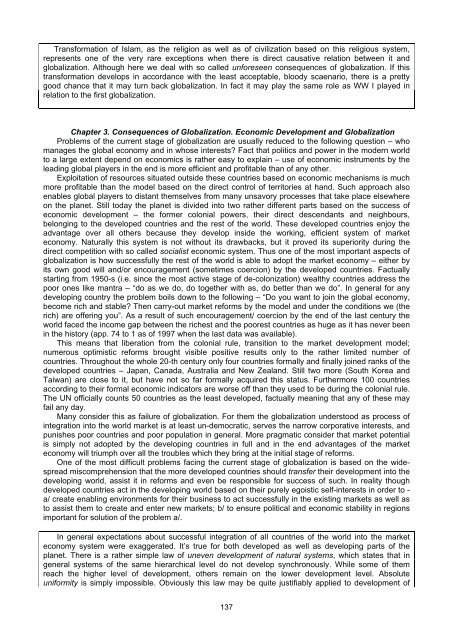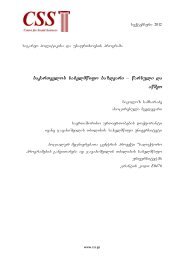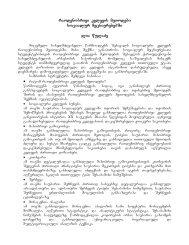Download - Center for Social Sciences
Download - Center for Social Sciences
Download - Center for Social Sciences
- No tags were found...
Create successful ePaper yourself
Turn your PDF publications into a flip-book with our unique Google optimized e-Paper software.
Trans<strong>for</strong>mation of Islam, as the religion as well as of civilization based on this religious system,represents one of the very rare exceptions when there is direct causative relation between it andglobalization. Although here we deal with so called un<strong>for</strong>eseen consequences of globalization. If thistrans<strong>for</strong>mation develops in accordance with the least acceptable, bloody scaenario, there is a prettygood chance that it may turn back globalization. In fact it may play the same role as WW I played inrelation to the first globalization.Chapter 3. Consequences of Globalization. Economic Development and GlobalizationProblems of the current stage of globalization are usually reduced to the following question – whomanages the global economy and in whose interests? Fact that politics and power in the modern worldto a large extent depend on economics is rather easy to explain – use of economic instruments by theleading global players in the end is more efficient and profitable than of any other.Exploitation of resources situated outside these countries based on economic mechanisms is muchmore profitable than the model based on the direct control of territories at hand. Such approach alsoenables global players to distant themselves from many unsavory processes that take place elsewhereon the planet. Still today the planet is divided into two rather different parts based on the success ofeconomic development – the <strong>for</strong>mer colonial powers, their direct descendants and neighbours,belonging to the developed countries and the rest of the world. These developed countries enjoy theadvantage over all others because they develop inside the working, efficient system of marketeconomy. Naturally this system is not without its drawbacks, but it proved its superiority during thedirect competition with so called socialist economic system. Thus one of the most important aspects ofglobalization is how successfully the rest of the world is able to adopt the market economy – either byits own good will and/or encouragement (sometimes coercion) by the developed countries. Factuallystarting from 1950-s (i.e. since the most active stage of de-colonization) wealthy countries address thepoor ones like mantra – “do as we do, do together with as, do better than we do”. In general <strong>for</strong> anydeveloping country the problem boils down to the following – “Do you want to join the global economy,become rich and stable? Then carry-out market re<strong>for</strong>ms by the model and under the conditions we (therich) are offering you”. As a result of such encouragement/ coercion by the end of the last century theworld faced the income gap between the richest and the poorest countries as huge as it has never beenin the history (app. 74 to 1 as of 1997 when the last data was available).This means that liberation from the colonial rule, transition to the market development model;numerous optimistic re<strong>for</strong>ms brought visible positive results only to the rather limited number ofcountries. Throughout the whole 20-th century only four countries <strong>for</strong>mally and finally joined ranks of thedeveloped countries – Japan, Canada, Australia and New Zealand. Still two more (South Korea andTaiwan) are close to it, but have not so far <strong>for</strong>mally acquired this status. Furthermore 100 countriesaccording to their <strong>for</strong>mal economic indicators are worse off than they used to be during the colonial rule.The UN officially counts 50 countries as the least developed, factually meaning that any of these mayfail any day.Many consider this as failure of globalization. For them the globalization understood as process ofintegration into the world market is at least un-democratic, serves the narrow corporative interests, andpunishes poor countries and poor population in general. More pragmatic consider that market potentialis simply not adopted by the developing countries in full and in the end advantages of the marketeconomy will triumph over all the troubles which they bring at the initial stage of re<strong>for</strong>ms.One of the most difficult problems facing the current stage of globalization is based on the widespreadmiscomprehension that the more developed countries should transfer their development into thedeveloping world, assist it in re<strong>for</strong>ms and even be responsible <strong>for</strong> success of such. In reality thoughdeveloped countries act in the developing world based on their purely egoistic self-interests in order to -a/ create enabling environments <strong>for</strong> their business to act successfully in the existing markets as well asto assist them to create and enter new markets; b/ to ensure political and economic stability in regionsimportant <strong>for</strong> solution of the problem a/.In general expectations about successful integration of all countries of the world into the marketeconomy system were exaggerated. It’s true <strong>for</strong> both developed as well as developing parts of theplanet. There is a rather simple law of uneven development of natural systems, which states that ingeneral systems of the same hierarchical level do not develop synchronously. While some of themreach the higher level of development, others remain on the lower development level. Absoluteuni<strong>for</strong>mity is simply impossible. Obviously this law may be quite justifiably applied to development of137
















